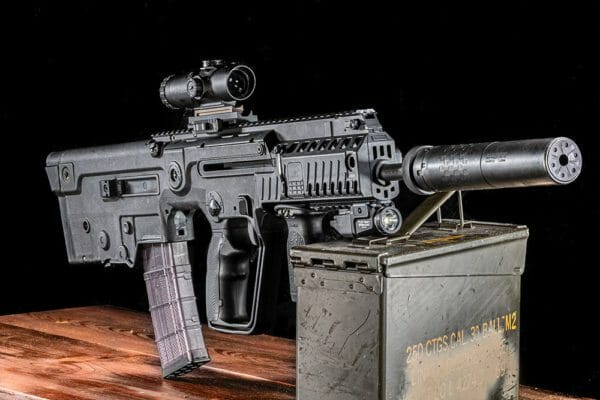
U.S.A. -(AmmoLand.com)- The IWI X95 is not a new firearm by any stretch, but it’s the first rifle to ever convince me of a bullpup’s worth. And where most gun reviews on the internet tend to be somewhat limited in their duration simply because of cost or time constraints, I’ve spent a few years carrying, running, and abusing the hell out of this little Israeli carbine. And as such, I’ve become acutely aware of its shortcomings as well as its strengths. So while the majority of early reviews of the X95 were glowingly positive, how does the compact blaster hold up after all this time? Let’s dive in and find out.
But before we get started, I wanted to mention that while I normally keep rifles relatively stock when doing reviews, this review is a long-term one. So I equipped the little bullpup with a few key upgrades to make it better suited to me personally. But none of these additions alter the gun’s functionality in any meaningful way.
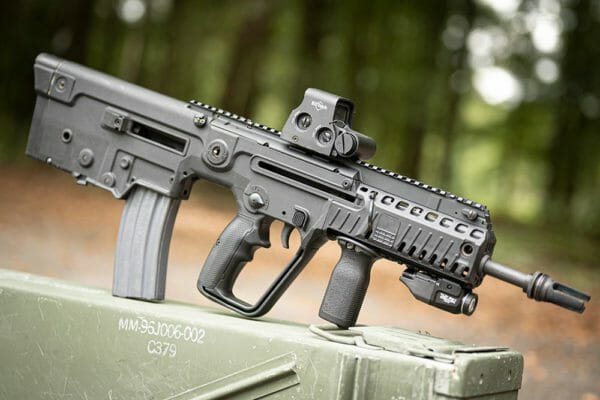
Israel Weapon Industries Tavor X95 Bullpup Rifle
Chambered in 5.56/.223, the X95 is the civilian version of the Israeli Micro Tavor. Both firearms operate via a long-stroke piston-driven system that is famous for its durability and reliability. (It’s the same basic method of operation used on the AKM as well as the M1 Garand.) Available in both 5.56mm and .300blk, the X95 feeds from standard AR-15 magazines (STANAG-pattern) that are available in basically any capacity physically possible.
The body of the X95 is constructed almost entirely of polymer, with the barrel, action, and mechanical components all being steel. These polymer components are available in OD green, FDE, and of course, plain ol’ black. I choose the latter because everything goes with black. But back to the internals for a moment.
While the X95’s long-stroke, gas-piston method of operation tends to make firearms heavier, and suffer from a very forward center of balance. (This is because a long-stroke piston utilizes a bolt carrier group affixed to the piston, resulting in a large, heavy mass. This also has the adverse effect of adding to the recoil impulse, since said mass is traveling at high velocity inside the firearm.) The latter of which makes these types of firearms extra tiring to shoulder for longer durations of time because the forward weight has leverage against the shooter themselves.
But since the Israel Weapon Industries Tavor X95 Rifle is a bullpup, these weight concerns don’t apply.
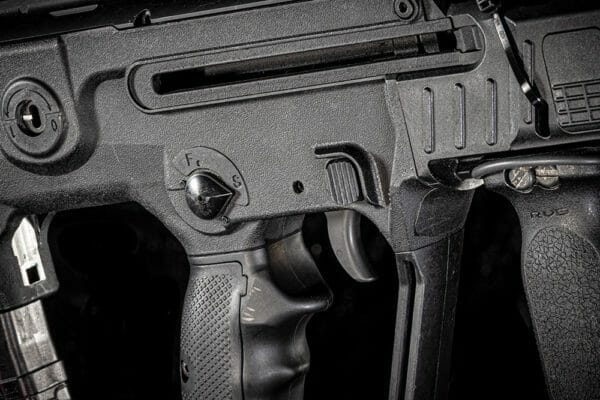
Bullpups – Core Design and Shortcomings
If you’re not familiar with the term, don’t worry. Despite what you read, not everyone on the internet is an expert – so let me save you a few minutes of Googling the term. A bullpup is a firearm whose action (the moving components behind the barrel) is located behind the pistol grip instead of in front of it. The benefits of this system are a better center of balance, and a shorter overall firearm without sacrificing barrel length and thus effective range. In a nutshell, bullpups were developed to give infantry the full capabilities of a standard rifle in a compact package the size of a submachine gun.
But like everything in life, there’s no free lunch – and these designs aren’t without their faults.
For instance, bullpups are prone to heavy, spongy triggers, since they have to utilize a trigger bar to connect the trigger to the hammer over the distance to the action. A prime example of a bullpup with a rough trigger is Steyr’s AUG, whose trigger feels like a cross between a staplegun and a Nerf toy. Which is to say, spongy, overly-heavy, and long as hell.
Additionally, bullpups normally suffer from an awkward manual of arms, and especially so when reloading; Because a shooter needs to reach under their armpit to insert a fresh magazine – and this becomes doubly difficult when done from a prone position.
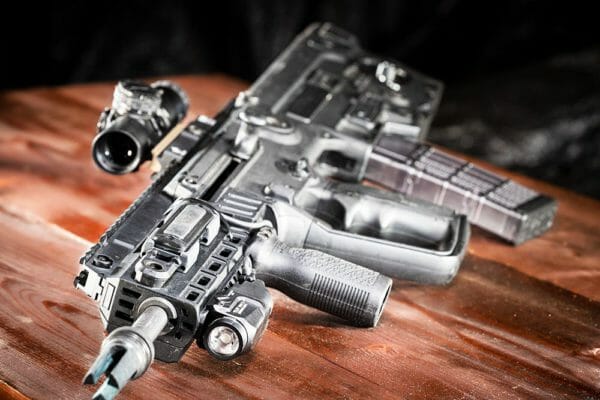
Israel Weapon Industries Tavor X95 Rifle – A Better Bullpup?
So does the X95 buck these trends, overcoming the shortcomings of the core design?
Well, it does and it doesn’t.
As for the trigger, the X95’s trigger is excellent for a bullpup firearm. While not much better than a mil-spec AR-15 trigger, the pull feels normal and it breaks with reasonable crispness. There are aftermarket options available, but I found that the factory trigger was sufficient for appropriate distances with the X95. And The terminology used in that last sentence is intentional but we’ll get to that later in the article.
The manual of arms is a different story. While the X95’s use of a push-button magazine release located in close proximity to the pistol grip is excellent, and objectively an upgrade of the full-sized Tavor, reloading is still fairly awkward.
In all fairness, inserting a mag into the magazine well isn’t difficult, but it certainly isn’t anywhere near as quick or easy as an AR-15 – but this can be overcome with sufficient training and practice. The bolt release, however, is remarkably strange, overly sensitive, and just odd in its implementation.
Between the pistol grip and the magazine well, the bolt release is a large boxy protrusion on the bottom of the gun. With practice, its weird design can actually be beneficial since a shooter could potentially insert a magazine and drop the bolt on it simultaneously. The problem with this design is two-fold.
First, the release is nearly hair-triggered. So it’s very easy to accidentally drop the bolt prematurely, and force the shooter to have to re-charge the weapon. Annoying, but not the end of the world. But it’s when attempting the lock the action open, that this design’s shortcomings becoming glaringly obvious. Because the release is subdued into the body of the gun itself, there’s not much for the shooter to grab to hold it open. And as I stated early, the release is on a hair-trigger. So placing the gun on a shooting table with the action open even a little too rough will cause the release to disengage and slam the action forward. Again, annoying, but not a deal-breaker.
The only part of that design I really have an issue with is how these awkward mechanics making clearing malfunctions a total pain in the ass. To the point that you feel like you need three hands to properly clear a jam.
The good news? In the 3,540 rounds I’ve fired through my personal X95 (at least according to my logbook) I’ve had 2 firearm-related malfunctions, and both were with the same magazine. This is despite the fact that I’ve only cleaned the gun once, and oiled it twice. The oiling was only necessary after 1,000-rounds of Winchester 3-gun ammo fired with my personal SilencerCo Saker ASR 762 attached had the entirety of the internals coated in a thick, dry carbon residue. Presumably without the accelerated wear and carbon buildup caused by the addition of a suppressor, the gun could have gone without cleaning for 4 or 5,000 rounds.
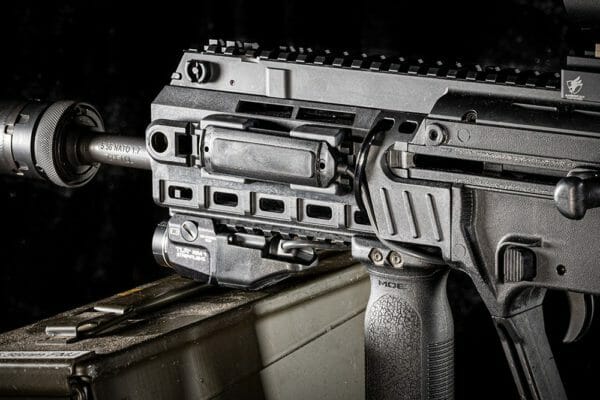
IWI X95 Rifle Downsides
Remember how earlier in the article I wrote about appropriate distances? That’s because the X95 out of the box is a 2.5-3 MOA rifle. Meaning, it’s only capable of slightly under three-inch groups at 100 yards. And this might seem ludicrous to AR-15 shooters accustomed to inexpensive, 1-MOA rifles. But you need to remember, this is a compact firearm utilizing the same method of operation as an AK. In essence, the Israel Weapon Industries Tavor X95 Bullpup Rifle is a compact, lightweight AK with better ergonomics designed for somewhat limited engagements. Now that said, even a 3 MOA firearm is capable of reliability engaging two-legged aggressors out to 400 yards – just not slamming small steel swinging targets at the distance.
Another drawback is the gun, is its tendency to blow carbon back in the shooter’s face when paired with a traditional sound suppressor. I found that a thorough cleaning dramatically reduced this, but the only real solution I found thus far is to use a cleaner suppressor like those from OSS, which captures the majority of the hot gas and carbon blowback before it has a chance to enter the weapon’s receiver. But on a very positive note, the fact that the center of balance is much closer to the shooter means that the added weight and length of a steel suppressor aren’t nearly as noticeable.
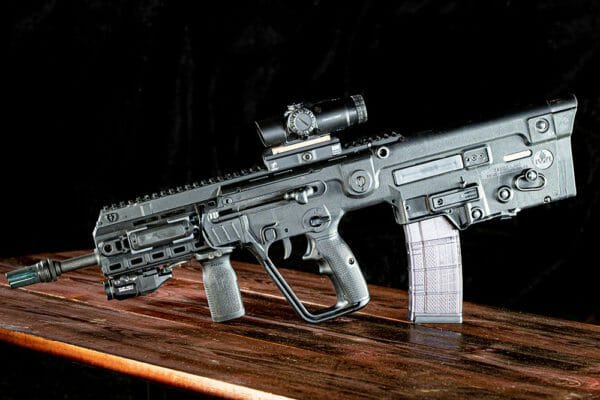
Israel Weapon Industries Tavor X95 Rifle Verdict
With an MSRP of $2,000, many shooters will find the X95’s appeal to be a tough pill to swallow. But the gun’s relative inaccuracy in my opinion is a fair trade-off for the reduced size and weight, as well as its quick-handling nature. And if a shooter wants something easy to maneuver in tight spaces or store in a backpack that has flawless reliability, the IWI X95 is king. But before you commit to buying one, you might want to pitch it as the perfect home defense gun for your wife first. That, or invest in a really comfortable couch to sleep on until she gets over it.
About Jim Grant
Jim is one of the elite editors for AmmoLand.com, who in addition to his mastery of prose, can wield a camera with expert finesse. He loves anything and everything guns but holds firearms from the Cold War in a special place in his heart.
When he’s not reviewing guns or shooting for fun and competition, Jim can be found hiking and hunting with his wife Kimberly, and their dog Peanut in the South Carolina low country.


